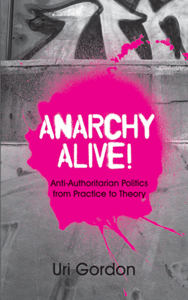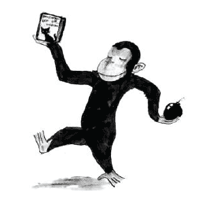Anarchism is a political philosophy and movement that is against all forms of authority and seeks to abolish the institutions it claims maintain unnecessary coercion and hierarchy, typically including the state and capitalism. Anarchism advocates for the replacement of the state with stateless societies and voluntary free associations. As a historically left-wing movement, this reading of anarchism is placed on the farthest left of the political spectrum, usually described as the libertarian wing of the socialist movement.

Freedom Press is an anarchist publishing house and bookseller in Whitechapel, London, United Kingdom, founded in 1886.

A black bloc is a tactic used by protesters who wear black clothing, ski masks, scarves, sunglasses, motorcycle helmets with padding or other face-concealing and face-protecting items. The clothing is used to conceal wearers' identities from both the police and politically different organizations by making it difficult to distinguish between participants. It is also used to protect their faces and eyes from pepper spray, which is used by police during protests or civil unrest. The tactic also allows the group to appear as one large unified mass. Black bloc participants are often associated with anarchism, anarcho-communism, communism, libertarian socialism and the anti-globalization movement. A variant of this type of protest is the Padded bloc, where following the Tute Bianche movement protesters wear padded clothing to protect against the police.
CrimethInc., also known as CWC, which stands for either "CrimethInc. Ex-Workers Collective" or "CrimethInc Ex-Workers Ex-Collective", is a decentralized anarchist collective of autonomous cells. CrimethInc. emerged in the mid-1990s, initially as the hardcore zine Inside Front, and began operating as a collective in 1996. It has since published widely read articles and zines for the anarchist movement and distributed posters and books of its own publication.

AK Press is a worker-managed, independent publisher and book distributor that specializes in publishing books about anarchism and the radical left. Operated out of Chico, California, the company is collectively owned.
Anarchists have employed certain symbols for their cause, including most prominently the circle-A and the black flag. Anarchist cultural symbols have been prevalent in popular culture since around the turn of the 21st century, concurrent with the anti-globalization movement. The punk subculture has also had a close association with anarchist symbolism.
Anarchism in the United States began in the mid-19th century and started to grow in influence as it entered the American labor movements, growing an anarcho-communist current as well as gaining notoriety for violent propaganda of the deed and campaigning for diverse social reforms in the early 20th century. By around the start of the 20th century, the heyday of individualist anarchism had passed and anarcho-communism and other social anarchist currents emerged as the dominant anarchist tendency.
Anarchism is generally defined as the political philosophy which holds the state to be undesirable, unnecessary and harmful as well as opposing authority and hierarchical organization in the conduct of human relations. Proponents of anarchism, known as anarchists, advocate stateless societies based on non-hierarchical voluntary associations. While anarchism holds the state to be undesirable, unnecessary and harmful, opposition to the state is not its central or sole definition. Anarchism can entail opposing authority or hierarchy in the conduct of all human relations.
Anarchism in Greece traces its roots to ancient Greece but was formed as a political movement during the 19th century. It was in the ancient era that the first libertarian thoughts appeared when philosophers based on rationality questioned the fundamentals of tradition. Modern anarchism in Greece emerged in the 19th century, heavily influenced by the contemporary European classical anarchism. Because of the Bolshevik success in the Russian Revolution of 1917 and the rise of the Communist Party, anarchism faded after the first decades of the 20th century. The collapse of the military junta put an end to the monopoly of the political power from the Right, whereas the dissolution of the Soviet Union diminished the allure of the Communist Party of Greece allowing anarchist groups to gain pace in Athens and other cities.
Anarchism in India first emerged within the Indian independence movement, gaining particularly notoriety for its influence on Mohandas Gandhi's theory of Sarvodaya and his practice of nonviolent resistance. Anarchism was also an influence on the revolutionary movement, inspiring the works of Har Dayal, M. P. T. Acharya and Bhagat Singh, among others.

Anarchy Alive!: Anti-Authoritarian Politics from Practice to Theory is a book by Uri Gordon that investigates anarchist theory and practice. An expanded reworking of the author's PhD thesis at the University of Oxford, the book was released by Pluto Press, a London-based radical publisher, in November 2007. It is presented as "an anarchist book about anarchism", and assumes some background knowledge and sympathy for anarchism on the part of the reader. Gordon considers his approach in the book to have many commonalities with that of anthropologist David Graeber, author of Fragments of an Anarchist Anthropology.
Contemporary anarchism within the history of anarchism is the period of the anarchist movement continuing from the end of World War II and into the present. Since the last third of the 20th century, anarchists have been involved in anti-globalisation, peace, squatter and student protest movements. Anarchists have participated in armed revolutions such as in those that created the Makhnovshchina and Revolutionary Catalonia, and anarchist political organizations such as the International Workers' Association and the Industrial Workers of the World have existed since the 20th century. Within contemporary anarchism, the anti-capitalism of classical anarchism has remained prominent.

Queer anarchism, or anarcha-queer, is an anarchist school of thought that advocates anarchism and social revolution as a means of queer liberation and abolition of hierarchies such as homophobia, lesbophobia, transmisogyny, biphobia, transphobia, aphobia, heteronormativity, patriarchy, and the gender binary.
Insurrectionary anarchism is a revolutionary theory and tendency within the anarchist movement that emphasizes insurrection as a revolutionary practice. It is critical of formal organizations such as labor unions and federations that are based on a political program and periodic congresses. Instead, insurrectionary anarchists advocate informal organization and small affinity group based organization. Insurrectionary anarchists put value in attack, permanent class conflict and a refusal to negotiate or compromise with class enemies.

Two Cheers for Anarchism: Six Easy Pieces on Autonomy, Dignity, and Meaningful Work and Play is a 2012 book-length defense of the anarchist perspective, written by anthropologist James C. Scott and published by Princeton University Press.

Anarchist Seeds Beneath the Snow is a 2006 book about anarchism and left-libertarian thought in Britain written by David Goodway and published by Liverpool University Press, then republished in 2011 by PM Press.
Anarchism and libertarianism, as broad political ideologies with manifold historical and contemporary meanings, have contested definitions. Their adherents have a pluralistic and overlapping tradition that makes precise definition of the political ideology difficult or impossible, compounded by a lack of common features, differing priorities of subgroups, lack of academic acceptance, and contentious historical usage.
Reinventing Anarchy: What Are Anarchists Thinking These Days? is a 1979 anthology of essays about anarchism edited by Howard Ehrlich, Carol Ehrlich, David de Leon, and Glenda Morris.
Anarchism in Norway first emerged in the 1870s. Some of the first to call themselves anarchists in Norway were Arne Garborg and Ivar Mortensson-Egnund. They ran the radical target magazine Fedraheimen which came out 1877–91. Gradually the magazine became more and more anarchist-oriented, and towards the end of its life it had the subtitle Anarchist-Communist Body. The anarchist author Hans Jæger published the book "The Bible of Anarchy" in 1906, and in recent times Jens Bjørneboe has been a spokesman for anarchism – among other things in the book "Police and anarchy".







